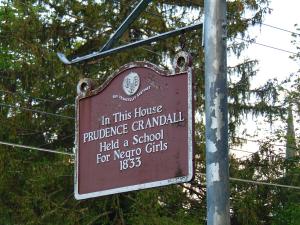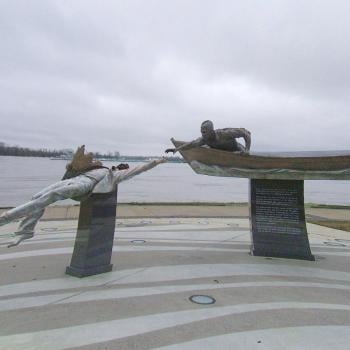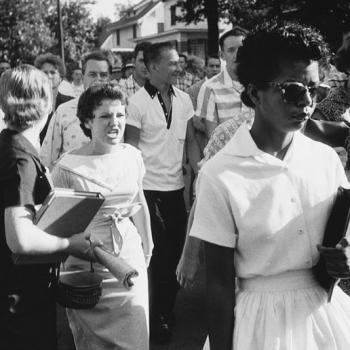
Prudence Crandall is recognized as the State Heroine of Connecticut. As a young teacher, in 1831, she had set about the business of forming the Canterbury, Connecticut Female Boarding School, a private school where young women throughout New England might come and be educated.
The following year, a family of freed black persons sent their daughter, Sarah Harris, to the Canterbury Female Boarding School. The Harris family was a fine, upstanding family of freed people, and as they were paying full tuition for Sarah, Prudence Crandall saw no reason not to admit her – and she didn’t think that anyone else could possibly have an objection, either.
Then came the exodus….
But as white families began pulling their daughters out of her school, Prudence Crandall came face to face with the reality of racism. And she began to ask herself some questions about just how her school would proceed. She had poured all of her savings into starting the school, and certainly couldn’t afford to watch it crumble.
And then she had a thought: If the white families of Canterbury, Connecticut didn’t want their daughters to go to school with young black women, what would happen if she simply opened a school for black girls? What if she committed to educating the daughters who had no advocate?
And so, in 1833, she announced to the remaining white students that the Canterbury Female Boarding School would close to white students, and would reopen only to blacks. She began advertising throughout New England for students, and families began enrolling their daughters.
Could Crandall educate young black girls in 19th century Connecticut?
But just a few weeks later, Crandall would meet her first test: Possibly in response to Crandall’s work, the state passed a “Black Law,” which made it illegal for black students from outside of Connecticut to come into Connecticut to attend school. Crandall’s next test would follow quickly after: Her students were subjected to hostility from townspeople. Doctors refused to provide treatment when they were ill. Stagecoach drivers refused to provide transportation. The school’s well was poisoned, and no one would help them get water. The school was damaged multiple times by vandals, and set on fire at least once.
Crandall was arrested, for having violated the “Black Law,” but her defense – that her school was private, and therefore anyone who could pay could choose to attend – was successful. But while she had legally won the right to keep her school open, the opposition was simply too great. Unwilling to risk harm to her students, Crandall closed the school, and left Connecticut with her husband, ultimately making her residence in Kansas.
It wasn’t until 1995 that Connecticut took steps to right its wrongs against Prudence Crandall, recognizing her as its State Heroine, for her willingness to stand with and advocate for vulnerable students.
Our people aren’t racist…
Before Sarah Harris applied to the Canterbury Female Boarding School, Prudence Crandall had been lulled into a false sense of complacency. Racism, injustice towards people of color – Crandall perceived those things were all “Southern things,” not issues for the moderate, educated people of the North. Those “Southern things,” she thought, were not an issue in Connecticut, among her people.
Only racism was an issue, even among her well-educated, religious, justice-seeking neighbors. Because even among the good people of early 19th century Connecticut, there was still much work to be done to overcome racism and injustice. The harvest was plentiful, and laborers like Prudence Crandall were too few.
How easy it is to be lulled into a false sense of complacency about the need for God’s laborers in the harvest. We try to convince ourselves that there are no acts of injustice for which our voices are required. We try to convince ourselves that there are none of God’s people for whom we need to be advocates. We try to convince ourselves that there are no hungry persons to feed, or naked persons to clothe, or prisoners to visit. If everyone just pulled themselves up by their own bootstraps, there wouldn’t be any problems, right?
The harvest is plentiful, but the laborers are few.
After this the Lord appointed seventy others and sent them on ahead of him in pairs to every town and place where he himself intended to go. 2He said to them, ‘The harvest is plentiful, but the labourers are few; therefore ask the Lord of the harvest to send out labourers into his harvest. (Luke 10:1-2)
When Jesus said these words to those whom he had sent forth into God’s harvest, he knew just how difficult it would be to be a laborer – to teach, to heal, to walk alongside suffering neighbors. For those who were sent forth, it may have seemed easy – initially. When the seventy returned to Jesus after going out into the towns and villages, they greeted him with great joy, amazed at what they could do in God’s name. “Even the demons submit to us,” they said. At that point, laboring in the harvest probably seemed really easy.
But Jesus knew that the day would come when it would not be so easy.
And that was why he needed them to know that while many might start on the road with them, some would fall away; the laborers who would be left in God’s harvest when times were truly challenging would always be few.
The laborers in the harvest are still few.
What does it mean to stand in the gap with neighbors?
Prudence Crandall risked her life and wealth to ensure that young black women in the early 19th century received the same kind of education that young white women took for granted. In the 21st century, Americans continue to face inequity in education – and the growing chasm between the “haves” and the “have nots” seems unassailable. Economically-challenged students – who more often are students of color – are too often cut off from thriving schools (public or private), and the students who most need support in reading, mathematics and sciences find themselves in failing systems.
That’s where the laborers come in – laborers who are willing to be advocates for economically-challenged students who continue to struggle in failing schools, laborers who are willing to volunteer to serve as math and reading coaches in economically-challenged schools, laborers who are willing to stock schools with uniforms and supplies, laborers who are willing to encourage with the gift of their presence, laborers who are willing to allow students to feel seen and heard, no matter their race, ethnicity, gender or economic status.
The only way to level the playing field for all American children is to ensure that all students have access to a quality education that sets them up for competitive work. Our nation’s economic success depends on having a skilled workforce. Years after Brown v. Board of Education attempted to right our historic wrongs in public school education, can we really afford to continue to let our students down?













